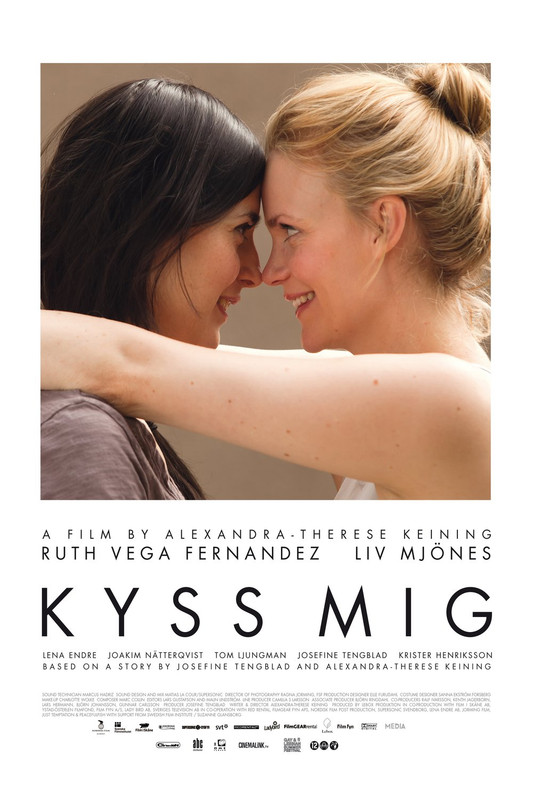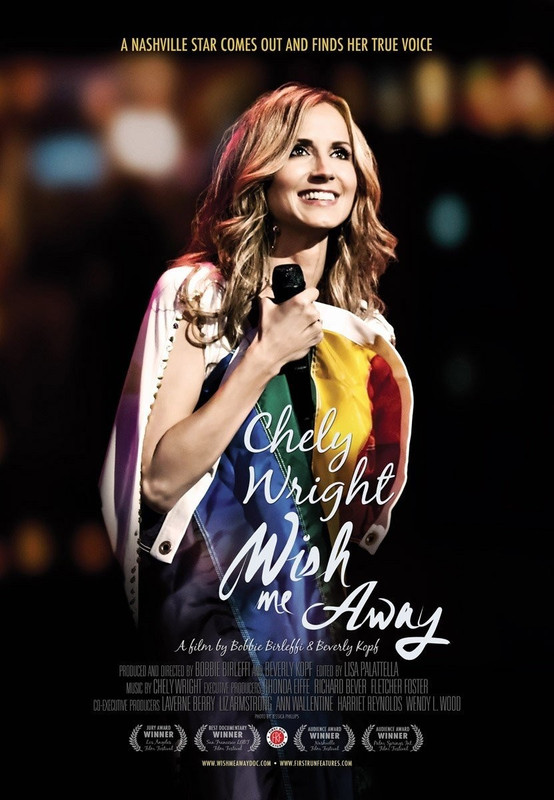Kiss Me
Dir: Alexandra-Therese Keining
A few years ago there was an uninspired British Rom-Com called Imagine Me and You, whose big twist on generic formula was simply that the person who wanted to spirit the bride away from her groom was - gasp - a woman. I guess that if Kiss Me (also known by the equally insipid title With Every Heartbeat) proves anything it's that it wasn't the idea but the execution that was rotten in that film.
Kiss Me begins with thritysomething Mia (Ruth Vega Fernandez) taking her fiance Tim (Joakim Nätterqvist) to her Father's (Krister Henriksson) 60th birthday party. There Mia meets her new soon to be stepmother Elisabeth (Lena Endre) and Elisabeth's thirtyish year old daughter Frida (Liv Mjönes). At first Frida and Mia don't get along, but on a brief break at Elisabeth's summer home, the two kiss and sleep together, setting off a lot of questions in both of their previously well ordered lives. It's a rather familiar straight girl meets gay girl story, a variation on what is the essential story of every second lesbian movie ever made.
What holds the film together and keeps it from being totally consumed by cliche is the strength and conviction of the ensemble performances. Mia and Frida's attraction to one another arises very fast, and very much out of the blue, but it convinces because Fernandez and Mjönes have very strong chemistry together, and also manage to give us a real sense of the emotional journey that each of these women is on. There's real weight behind their decisions too; we see what's left in the wake, most of the time romantic films just brush the very idea of emotional debris under the rug, but Kiss Me acknowledges it, while also allowing us to root for Mia and Frida's relationship. The support is also good, with an especially strong showing from Lena Endre.
While the film does indulge in cliche at times it also plays with it a little bit. The romantic movie staple of the race to the airport ending does crop up, but it's played a little differently than usual. That's probably a good summation of Kiss Me; it hardly reinvents the wheel, but it's expertly made, and makes just enough changes to what has gone before to be an engaging 100 minutes.
★★★
Wish Me Away
Dir: Bobbie Birleffi / Beverly Kopf
I confess, based on what we hear in this film, I'm not the greatest fan of Chely Wright's music, which seems to have been, until recently, largely country pop cast from the Shania Twain mould but, while it does of course address her career and her status as an artist, Wish Me Away is about much, much more than that. Wright became a massive star in Nashville's country music scene, with a series of hit albums and singles and critical acclaim. She also, it seems, became a well loved celebrity; dedicating herself to charity work for disadvantaged kids and the military among others. Outwardly she appears to be the perfect all American girl made good; a Christian with strong values who loves her country and sings and looks like the girl you wished lived next door. She was also, that whole time, gay.
Wish Me Away sees Wright, in incredibly personal and exposing fashion, put her decision to come out, and the almost military precision with which she decided to do it, under the microscope of directors Bobbie Birleffi and Beverly Kopf. She comes out of it very well. Wright's story powers the film, and it's largely self told, whether through (often devastating) video diaries, interview footage or a meeting we sit in on between her and her spiritual adviser. As the film runs on we hear about the pivotal things that drove Wright to, in 2010, become the first country musician to come out. From the bargain she made with herself as a very young girl that she'd pray extra hard to God, and be extra good, if only he'd make her not gay to the moment she found herself with a gun in her mouth, and how she didn't pull the trigger, there are many difficult and moving stories shared here.
Wright does touch on the fact that she probably hurt people in hiding her sexuality, from her girlfriends (including a woman, never named or otherwise identified, she calls the love of her life) to the men that she dated to maintain the appearance that she was straight. he talks with evident regret about Brad Paisley, another country musician with whom she had a serious relationship which seems to have ended abruptly. It's a bit of a shame the film doesn't talk to Paisley, because while Wright is incredibly likeable it would serve the film well to discuss a few of her less admirable moments.
That's not to say, however, that Wish Me Away is anything but a penetrating insight. Wright - and to an only slightly lesser degree her family - is laid bare here. She says that she is coming out both for herself ('to live my complete truth') and for others who find themselves in her situation, in the hope it might give them some hope and some strength. You could see this latter motivation as egotistical, but it doesn't feel like it, and has been borne out in Wright's activism since she came out. It's also borne out in this film, which is both an incredibly moving personal story and manages to preach equality without feeling hectoring. I was often genuinely moved, and I suspect you will be too.
★★★★
American Translation
Dir: Pascal Arnold / Jean-Marc Barr
Pascal Arnold and Jean-Marc Barr's latest directorial collaboration seems like something of an odd choice for LLGFF, as it is largely about an obsessive, co-dependent, heterosexual relationship. Chris (Pierre Perrier) and Aurore (Lizzie Brocheré) meet and immediately fall deeply in lust. Their relationship progresses fast, and soon Chris is living with Aurore in a flat belonging to her Father. All would be perfect, but Chris' behavior is frequently odd and controlling, and, Aurore soon discovers, he has a disturbing hobby; every now and then he picks up, has sex with, and strangles rent boys. Even when Aurore discovers this, her love for Chris keeps them together.
American Translation is an intense and creepy film that really gets under your skin, thanks largely to two excellent performances at its centre. Pierre Perrier is handsome enough to convince you that he could spirit the stunningly beautiful Lizzie Brocheré away, and that he'd be seen by his victims as not just harmless, but a trick significantly less unpleasant than most, and he's also convincing as a man who has learnt to wrap his controlling character in enough flattery that the people he is manipulating almost invite it. He straddles the line between deeply unsavoury and seductive with skill, while also convincing as a psychopath. There are shades here of Martin Sheen's Kit from Badlands, but also of the killer from Eric Stanze's grueling, upsetting, Scrapbook.
Brocheré is equally good, particularly as the reality of who Chris is begins to dawn on Aurore, without making her think of getting away from him, along with Perrier she provides a layered portrait of a disturbingly co-dependent relationship. One of her best moments comes as Aurore witnesses, up close, how Chris chooses and kills a victim. Much of the murder scene is played on Brocheré's face as Aurore tries to reconcile this act and the person she clearly, deeply, loves. It's terrifying scene not just because one person is committing a a brutal murder but because we see the whole process of another person rationalising it.
Arnold and Barr pace the film very patiently, refusing to make a conventional thriller. For about forty minutes after Chris and Aurore meet the murders disappear from the film, and it becomes an explicit (I lost count of how many nude scenes Brocheré has) relationship drama with a disturbing undertone. This works because it develops the characters as real three dimensional people, and makes their dysfunctional relationship one we believe in, even if we struggle to understand it, all of which gives weight to what happens after this time has been put in. The co-directors also find a lot of really interesting visuals, from the first time Chris picks up a rent boy when he is with Aurore, and the way she is shunted to the side of the frame, to a memorable final shot.
American Translation is a tough, intelligent, slow burning adult thriller, and I hope its inclusion in the LLGFF doesn't suggest that it will be ghettoised as 'a gay film', because it deserves to be widely seen.
★★★★




No comments:
Post a Comment